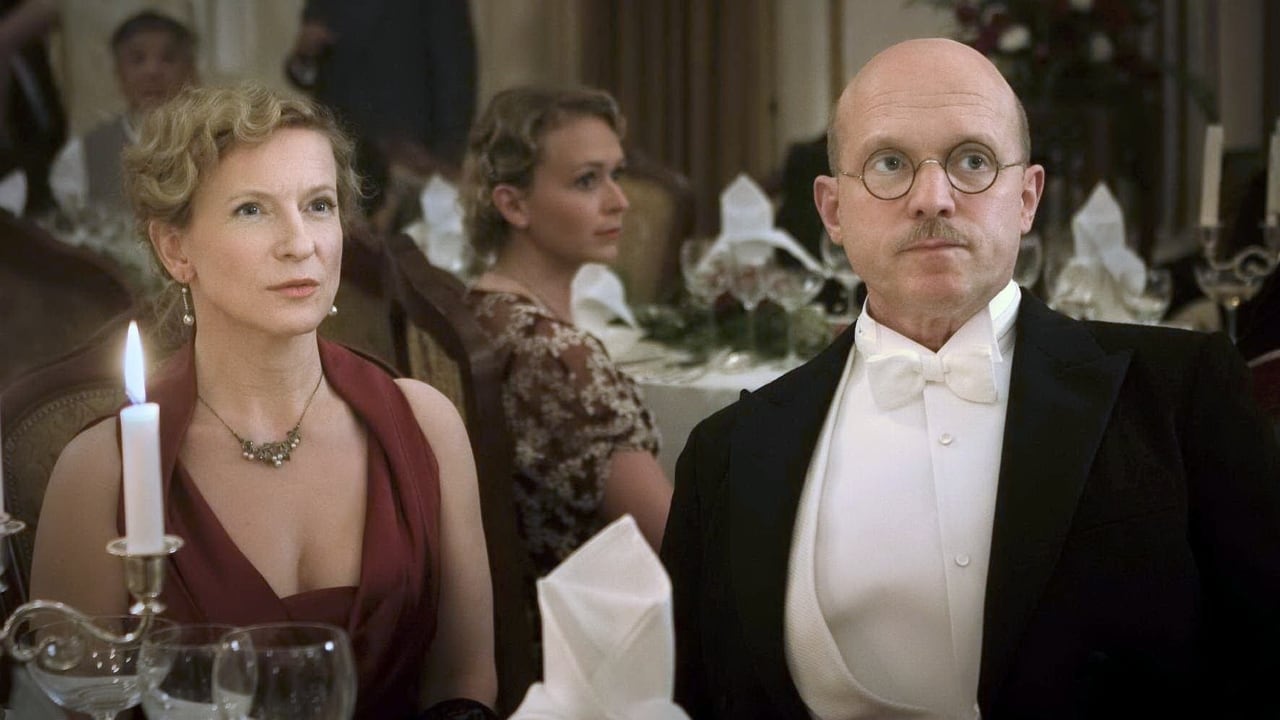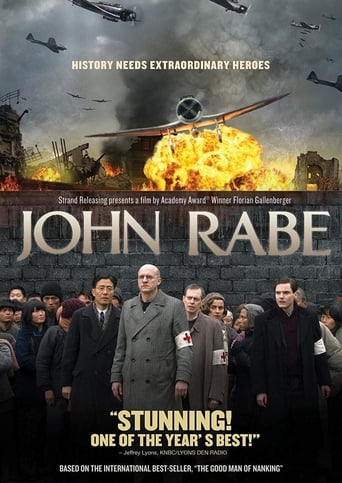ReaderKenka
Let's be realistic.
Mabel Munoz
Just intense enough to provide a much-needed diversion, just lightweight enough to make you forget about it soon after it’s over. It’s not exactly “good,” per se, but it does what it sets out to do in terms of putting us on edge, which makes it … successful?
Yash Wade
Close shines in drama with strong language, adult themes.
Sarita Rafferty
There are moments that feel comical, some horrific, and some downright inspiring but the tonal shifts hardly matter as the end results come to a film that's perfect for this time.
Robert J. Maxwell
Impressive visual effects in this story of John Rabe, a German businessman running the Siemens factory in Nanking, China, as the city is first threatened, then occupied and its residents brutalized by the Japanese Army in 1937.Along with a handful of other internationals, Rabe is instrumental in forming a committee to operate the factory as a "safety zone" in which women and children are safe from the invading soldiers. His credentials as a German citizen, a formal ally of Japan, is one of his most important contributions to the task. It works, more or less, but not without suspenseful hitches.Not too much is shown of what the soldiers did to the citizens of Nanking, which is all for the good. Nobody would believe it. Three hundred thousand Chinese died at the time. That would be about half the population of contemporary San Francisco. The Chinese were eliminated wholesale and in a disorganized and whimsical way. Some of the living were used as bayonet practice targets. How does a culture that promotes such delicate arts as bonsai and origami, that is so terribly polite, manage to tolerate such brutality in its military? Nobody knows. The anthropologist Ruth Benedict tried to explain it in terms of the difference between "shame" and "guilt." At any rate, the cast varies in the way it fits the characters. John Rabe is played by Ulrich Tukur, the nominal hero, and he couldn't be a better choice -- distant, formal, and yet as mousy as Donald Pleasance with a mustache would have been. Anne Consigny as the French school mistress is strikingly beautiful and gives a fine performance. Steve Buscemi is, at first, the undiplomatically brash American doctor who hates Rabe for his Teutonic background but eventually learns to respect and admire him. Buscemi doesn't seem to belong. With his pale face, bulging eyeballs, and shark-like incisors, he looks more like Dracula than a doctor, and he sounds as if he just ran away from a Quentin Tarantino set.In a way it's a formula movie, rather like "Schindler's List", the kind of movie that wins awards. For the most part, the good guys are attractive and the bad guys are ugly. A handful of high-status types band together at the risk of their own lives to save several thousand Chinese. Certain select Japanese officers are clearly the villains but there's even a "good Japanese" who passes on warnings in an attempt to prevent more mass murders. The happy ending is requisite.But it's a moving story. How could it not be?
dennis-karjala
This film is worth seeing, if only because we in the U.S. have not really learned very much about the Rape of Nanking. Beyond that, it is a gripping film with believable characters. However, a crucial point was overlooked by the director. The whole reason the Safety Zone was going to be razed, and the reason it was eventually taken over by the Japanese, was that the school was harboring Chinese prisoners of the Japanese, i.e., Chinese soldiers, who if caught by the Japanese would have been massacred. But at the end of the film, the Japanese do take over the Safety Zone, so it seems unlikely that they would not have discovered the prisoners. Consequently, again a huge risk was taken by Rabe and the others, not to mention the Chinese "defenders," for a futile purpose.
makelvin
Prior to watching this file, I have read John Rabe's diary as well as Iris Chang's The Rape of Nanking. I have also watched many documentaries and movies made about the subject from China as well as from the US. I found this film to be one of better film on this subject than most of the other ones in existence today.The film is based primarily on the actual diary of John Rabe. Certain details were filled-in by the excellent and exhaustive work of Iris Chang's The Rape of Nanking. The importance of John Rabe's diary as opposed to the other accounts of what happened during the massacred is the fact that John Rabe was a German Nazi Party member that was working for Siemen in China. Germany was an allied of Japan at the time and there would have been no reason for John Rabe to have lied about atrocities committed by the Japanese if it did not actually happened. Also since John was mainly writing this as a personal diary for himself, there does not seem to be any reason for him to have exaggerated his description of the event. As a result, his diary is probably the credible historical account of the what actually happened in Nanking.I found some the Chinese version of the film on the subject seemed a little removed from the complex character interactions between most of these reluctant heroes of war. As a result, those movies does not seem quite as genuine and touching as this film.Most the events from this film seems very accurate or at least true to the overall sense of John Rabe's diary. Obviously some of the atrocities had to be consolidated to be able to fit those events into a slightly over two hour film. But one of the most puzzling inaccuracy of the film was the fictional character Valérie Dupres at the International Girls College. Why was it necessary for the film to use a fictional character's name instead of the actual courageous heroine Minnie Vaultrin from the Ginling Girls College. She had done so much during the massacred that it seems unfair to not use her real name in the film. This is my primary reason for not giving this film a perfect 10. If anyone can provide an explanation as to why Minnie Vaultrin name was not used in this film, I really would appreciate it.
Russell Claus
The film John Rabe is movie about two things, both interesting, both unknown, and both controversial: the "good" Nazi, and the Rape of Nanking. There have only been a few films about "good" Nazis that I know of, although I'm sure there are others I'm missing, this film, Seven Years in Tibet, and the 49th Parallel. This alone makes this film interesting.But John Rabe (the film) is also about the Rape of Nanking, the atrocities committed by the Japanese military to the Chinese people in the city of Nanking. This also would be enough to make this movie interesting.So we have a movie with two interesting topics, but ultimately fails as a compelling work. Why? The director pulled far too many punches in regards to the violence of Nanking. Maybe I'm a little hardened by watching films, but there was nothing about this movie that jumped out at me and drove home the lawlessness and violence of the Japanese occupation of Nanking. There is no way to show this and be discreet. The middle of the film was crying for a lurid montage of gang rapes, flies on corpses, and the worst depravities you can think of. John Rabe's own diaries describe many of these, you wouldn't have even had to think up any of your own and you could have had his character narrated the whole thing.The film fails in depicting the Rape of Nanking, but it also fails in depicting the good Nazi too. The movie needed a moment, several years later, with John Rabe confronting the Nazi atrocities in WWII and comparing them with the Japanese atrocities in Nanking. We need to see him understand what his own people have done and what his membership in the Nazi party truly means as a stain on his character. We needed to see him understand that and tear up his membership card or something. We, however, do not and the movie is much the poorer because of it.Despite this, the movie is still beautifully shot, with good production value, limited but effective CGI, and wonderfully acted. The movie is ultimately frustratingly incomplete and is not the best that could have been done with the material, but it was enjoyable while it lasted.

